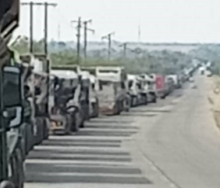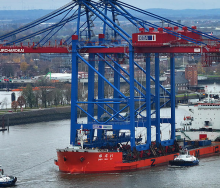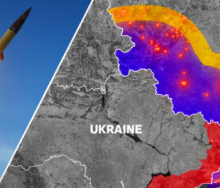Road hauliers passing through Zambia’s Chirundu border into Zimbabwe yesterday queued for more than 10 kilometres because of a state visit to the notoriously congested crossing.
Ordinarily cargo traffic snaking south is caused by inflexible security procedures by the Zimbabwe Revenue Authority (Zimra) which insists on scanning even empty containers for smuggled goods.
But yesterday the backup north of the border wasn’t caused by Zimra but by personnel from the Zambia Revenue Authority (ZRA) who scurried about, sprucing up facilities in preparation for a presidential inspection.
The visit by Zambian leader Edgar Lungu ironically came on the last day of a ZRA initiative instituted last Sunday morning and aimed at de-congesting the north-bound queue which in the recent past would stretch for well over 20 kilometres into a safari area south of the Zambezi River.
Yesterday marked the end of that seven-day 24-hour operational testing period - and according to long-distance transport consultant Mike Fitizmaurice, the data gathered during the experiment should vouch for its success.
The chief executive of the Federation of East and Southern African Road Transport Associations (Fesarta) added that he had requested to see updated information about north-bound traffic using the border.
“Usually anything from 280 to 320 trucks pass through that border every day. My guess is that over the last week that number has gone up to around 600 trucks on a daily basis.”
As a result of decongesting the north-bound back-up, Freight News hasn’t heard of any incidents south of the border.
A few days ago a long-distance driver from South Africa had to be rushed to a hospital in Harare after he was trampled by an elephant on the southern side of Chirundu.
In another incident a truck parked on the Zambian side of Chirundu, presumably because of a driver cooking in his cab, caught fire and was completely gutted, also spreading its destruction to an adjacent rig.
Fitzmaurice has time and again stressed that these incidents are directly responsible for blocking up an important border where inefficient services and systems, compounded by testing procedures for the coronavirus, have led to the bottlenecking of traffic.
It was hoped, he said, that like Zambia’s Nakonde border into Tanzania, Chirundu would become a permanent 24-hour operation.
As for Zimra’s inability to follow suit, especially last week when ZRA opened its side of the border on a round-the-clock basis, it’s because of human resource shortages in Zimbabwe.
“There is a lot of resistance from agencies,” Fitzmaurice said. “Immigration, the Bureau of Standards, the health department – they simply haven’t got the staff to match ZRA hours.”













